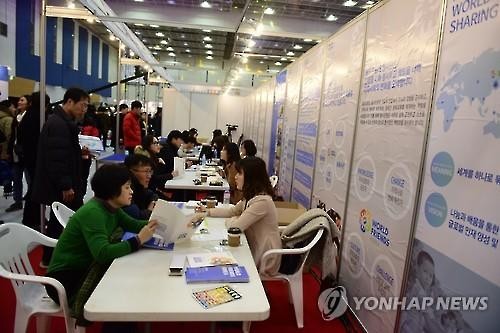ID :
397757
Mon, 02/22/2016 - 02:20
Auther :
Shortlink :
https://oananews.org//node/397757
The shortlink copeid
S. Korean youth look overseas in search of better lives

By Choi Soo-hyang
DAEJEON, Feb. 20 (Yonhap) -- When 26-year-old graduate student Jo decided to go to a graduate school, he did not have many other options.
Failing to find a job after receiving a diploma at a local undergraduate school, Jo, who asked his first name not be used, chose to continue studying instead of staying idle.
Six months before wrapping up his master's degree, Jo visited an overseas job fair to seek job opportunities he could take outside of this country.
Government data released earlier this month showed that the unemployment rate for those between 15 and 29 jumped to a seven-month high of 9.5 percent from 8.4 percent tallied in December.
Jo's visit, however, is not simply because of the frozen local job market, but also the poor working conditions and plunging quality of life employers experience here.
People put years of effort into getting a job only to find out later that they have become a "working machine," he said.
According to data compiled by the Organization for Economic Cooperation and Development (OECD), South Koreans work the second-longest hours among all member countries, trailing Mexicans.
A South Korean on average worked 2,124 hours in 2014, up 45 hours from a year earlier. It is 1.2 times more than the average for the Paris-based organization that counts 34 developed market economies. Data for 2015 is not yet available.
"My friends working at small and medium-sized enterprises worry about their companies closing down and others working for large corporations struggle amid harsh competition," Jo said at a job fair in Daejeon, located some 164 kilometers south of Seoul. "What they both complain about is that they have no time for themselves."
He is not the only one looking for opportunities abroad.
On the first day of the two-day job fair held by the Korea International Cooperation Agency (KOICA), about a thousand people visited the venue.
The crowd included a group of high school students who flew all the way from the country's southern resort island of Jeju to participate in the job fair.
Kim Young-jo, a teacher at Hamdeok High School who guided the students, said he wanted to show them that there are many more options than getting into a company in South Korea.
Reflecting rising interest, the booth set up by the Human Resources Development Service of Korea that deals with overseas employment was one of the busiest booths among dozens of others.
Lee Woo-jin, an official at the state-run organization, said he was surprised to welcome so many visitors.
"The queue got so long that we had to hand out waiting number tickets to prevent them from standing for hours," he said.
When the state organ and the Korea Trade Investment Promotion Agency first signed a memorandum of understanding on overseas employment in 2010, they helped about 300 people find jobs abroad, Lee said. The number has soared up to some 2,900 in 2015.
Looking at job seekers asking for advice, Lee said he saw many who have a desire to go abroad since the circumstances here are so bad right now.
"The whole country is talking about how the youth are suffering," Lee Jin-sook, the co-host of the expo who is also the head of the Daejeon arm of TV broadcaster MBC, said during the opening ceremony.
"This generation has received more education than any others in the country's history, but they are called 'a generation that has to give up,'" Lee said, referring to a newly-coined expression.
South Korean young people self-deprecatingly call themselves the "Sampo generation," meaning they have to give up employment, marriage and childbirth.
Social and economic pressures force them to have fewer job opportunities and make them unable to afford high rent and childcare expenses.
As other factors such as dating, personal relationships and hope are added to the sacrifice list, now they even call themselves the "N-po generation," meaning what they have to abandon to live in this country is infinite.
A 23-year-old South Korean college student surnamed Song who worked at a small start-up company in Italy last year said she has no regrets about seeking a job abroad.
"Compared to the efforts people put in to get a job here, what they end up doing in the companies are often very time-consuming and trivial," she said.
Song was able to work with an American boss in the European country who appreciated her comments and respected her personal life.
Recently, some major corporations in the country started demanding voluntary retirement of employees in their 20s and 30s, reflecting the bad economy.
"In the strict hierarchical system of South Korean firms, one of the few benefits, I think, was the work stability, which guaranteed people to work until they reached a certain age," she said. "But now, I am skeptical about that too."





